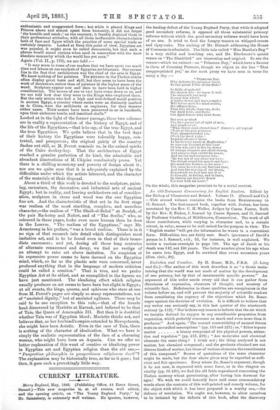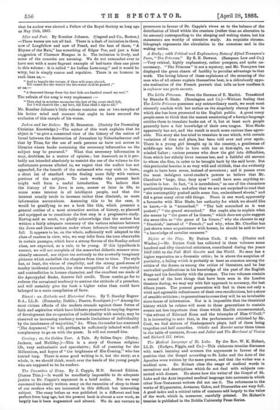Evolution and Creation. By H. Bosse, M.D., F.R.S. (J. Leng
and Co.) —The author of this work describes it as "a thesis main- taining that the world was not made of matter by the development of one potency, but by that of innumerable specific powers." An argument of this order needs every aid that it can gather from directness of expression, clearness of thought, and mastery of scientific fact. Deficiencies in these qualities are conspicuous in the volume before us, and will prevent the majority of scientific readers from considering the cogency of the objections which Dr. Boase urges against the doctrine of evolution. It is difficult to believe that any writer can seriously say, in this last quarter of the nineteenth century (p. 112), "Nor is there any reason to believe that the air which we breathe derived its oxygen in any considerable proportion from vegetation, which probably consumes as much and even more than it produces." And again, " The mutual convertibility of natural forces rests on unverified assumptions" (pp. 113 and 227) ; or, "Ether is pure matter a binary compound of the physical powers, attrac- tion and repulsion" (pp. 217, 218) ; "Are molecules and chemical elements the same thing ? I think not ; the thing analysed is not matter, but chemical compound ; and the products obtained are not diverse kinds of matter, but those of various elements, the constituents of this compound." Scores of quotations of the same character might be made, but the four above given may be regarded as suffi- cient and fair specimens. Even where Dr. Boase's argument, though it be not new, is expressed with some force, as in the chapter on vitality (pp. 95-120), we find the old fable reproduced concerning the Theban mummy wheat germinating, after having lain dormant for ages ! We wish we could honestly have said some commendatory words about the contents of this well-printed and comely volume, for the object with which it has been prepared is a worthy one,—the defence of revelation. We ought not, however, to allow ourselves to be irritated by the defects of this book, after the discovery
that its author was elected a Fellow of the Royal Society so long ago as May 11th, 1837.



































 Previous page
Previous page